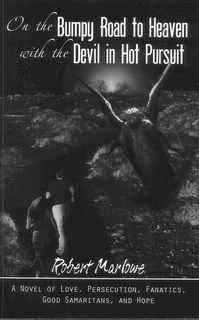
Chico novelist -- Intrigue and terrorism in France and beyond
By DAN BARNETT
Retired Chico State University Professor Michael Ramon, writing under the name of "Robert Marlowe," has produced a fast-paced political thriller with the ungainly title of "On the Bumpy Road to Heaven With the Devil in Hot Pursuit: A Novel of Love, Persecution, Fanatics, Good Samaritans, and Hope" ($17.95 in paper from Infinity Publishing at www.buybooks-ontheweb.com).
It's the love story of beautiful Princess Yasmine Omar, half French and half Arab, "the favorite granddaughter of the King of Omar," and Joshua Wiesel, the stepson "of the next Prime Minister of Israel." Joshua works as a translator for the Israeli secret service but meets Yasmine in the school they are attending in Paris and falls madly in love. Though the couple just wants to be left alone, their attraction for one another causes an international crisis.
Joshua and Yasmine come under the sway of Professor Leon Carnot, Yasmine's world-renowned philosophy instructor. Carnot preaches "peace, understanding, and tolerance" and he is portrayed in the novel as a modern-day Socrates, accused by his Jewish, Christian and Muslim students of being an atheist. His teachings are deeply influential in the couple's lives, holding the pair together as both Arab and Jewish interests offer huge rewards for the capture of Yasmine and Joshua, the latter (falsely) accused of killing several of Yasmine's guards and kidnaping the princess.
At one point, sipping hot chocolate, Joshua tells Yasmine that "they have no right to tell us whom to love or to marry. That's strictly between us and God. ... We pass through this life only once, and we should do it our way, not theirs. I'll fight them until we're happily married. That I promise you on what I hold most sacred." For Joshua, it's all about being "free to create your own future," as Carnot had taught.
Later, asked how he might "stop the hatred and carnage in Palestine" Joshua responds idealistically: "By making both sides realize that if things stay as they are, hatred will lead to more war, misery and suffering, and that will lead to more hatred. ... I'm just a young liberal Jew who's proud of his ancestry and heritage, but who doesn't want to repeat the mistakes of the past. I know what thousands of years of oppression and the Nazis did to my people, and I refuse to do the same to the Palestinians. I want to live and let live."
Perhaps the most dangerous opponent the couple faces is Karim Kassim, a billionaire Arab businessman who is really the director of the Paris-based cell of al-Qaida. Later in the story, Chief Inspector Picard muses with reporter Rick Sorel (who is contributing pieces on the couple to the Paris Gazette) about the terrorists. "They've been radicalized by a group of Islamic demagogues who want to gain political power by using them as cannon fodder," Picard says. "If they were educated, they would interpret true Islam as a religion of love, forgiveness, and compassion, but they aren't. ... They're ignorant, superstitious and easily deceived."
That provokes a response in Sorel: "You know, we have the same problem in Christian America. Millions of fundamentalists have been brainwashed by TV evangelists into believing that if they support the violent policies of Jewish warmongers, they'll bring about Armageddon, the second coming of Christ and the kingdom of God!"
Marlowe's writing style was distracting for me. Characters talk in cliches and seem to be either very good or very evil and, most disturbingly, are little affected by the carnage around them, escaping near death one moment and worried about lunch the next. It's the same feeling I used to get watching "Murder, She Wrote."
The plot itself is what kept me turning the pages, and it gets very complicated. Joshua and Yasmine are befriended by Sorel and Andree de la Roche, a female reporter also working for the Gazette; Moses Bloom, an arms dealer with a good-as-gold heart whom Joshua calls "uncle"; and quite a few other characters including detectives and editors. The bodies of their friends begin to pile up, and Rick and Andree are almost strangled to death ("this isn't a romance novel, you know," he says), but in some sense Carnot's philosophy triumphs in the end amid a wealth of political deal making. Better that, Marlowe might say, than shooting at each other.
Dan Barnett teaches philosophy at Butte College. To submit review copies of published books, please send e-mail to dbarnett@maxinet.com. Copyright 2005 Chico Enterprise-Record. Used by permission.
No comments:
Post a Comment